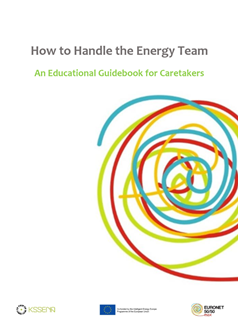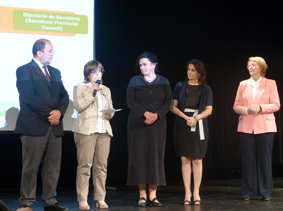Kaj je novega?
Druga številka Euronet 50/50 MAX novic
V drugi številki Euronet 50/50 MAX novic si lahko preberete več o dobrih praksah, ki so jih razvile sodelujoče šole. Vsaka izmed njih ima svoje izkušnje na področju energetskega izobraževanja, energetske učinkovitosti in dela z energetskimi skupinami. V novicah boste izvedeli več tudi o ordjih in dokumentih, ki so nastala v okviru projekta in s katerimi si lahko pomagamo pri doseganju energetskih prihrankov. Drugo številko novic najdete na tej povezavi.
Energy savings achieved in Slovenian schools
Slovenske šole v letu 2014 dosegle zelo spodbudne energetske prihranke!
V septembru je v Rigi potekal peti projektni sestanek, na katerem so partnerji projekta Euronet 50/50 MAX predstavili energetske prihranke, ki so jih dosegle šole v njihovi državi. 30 osnovnih šol, ki je vključenih v projekt Euronet 50/50 MAX v Sloveniji in ki jih koordinira partner Zavod Energetska agencija za Savinjsko, Šaleško in Koroško (Zavod KSSENA), je v letu 2014 pridno varčevalo in doseglo več kot spodbudne prihranke pri rabi energije. KSSENA je s pomočjo Euronet orodjaizračunala, da so slovenske šole zgolj v enem letu rabo energije znižale kar za 5,8 %! Povprečen prihranek na šolo je tako znašal več kot 22.000 kWh energije in skoraj 2.450 €. Še bolj spodbuden podatek je, da so v preteklem letu v naše okolje šole izpustile skupno kar 234 ton toplogrednih plinov manj. Bravo in čestitke!
Leto 2015 je že skoraj pri koncu in prepričani smo, da so učenci tudi v tem letu vestno varčevali z energijo. Prihranke bomo izračunali v začetku leta 2016, aprila naslednje leto pa se bo projekt Euronet 50/50 MAX tudi zaključil. Pred tem bo KSSENA učence vseh šol povabila na veliko družabno srečanje z zabavno-izobraževalnim programom, kjer bomo skupaj proslavili naša prizadevanja.
Passing the baton in the School Complex in Čáslavice, Czech Republic
News from Cyprus
In total 40 teachers and 136 students are directly involved in the project, while more than 1900 are involved indirectly. Dedicated meetings were attended by the headmaster, the teachers coordinating the work of the energy team and - in some cases - also the students participating in the team. CEA\'s staff explained the attendants how to implement the 50/50 methodology step by step, how to use presented measuring devices, as well as went through the educational booklet and the lesson scenarios in order for the teachers to feel comfortable with them. Before the meetings, the schools were also asked to gather and provide electricity and heating bills, which will be later used to calculate the energy savings.
The overall feedback received from schools was positive and encouraging! The teachers highlighted that educational boxes will facilitate their work with the energy teams a lot. The students were really enthusiastic with the measuring devices, the posters and other material provided. The headmasters and teachers understood the 50/50 methodology and committed to engage all building users in the school’s efforts to save energy.
Evaluation of the first year of implementation of the 50/50 concept
The 1st cycle of implementation of the 50/50 methodology has been completed and it's time for its evaluation! We asked representatives of schools and other public buildings involved in the project about their experiences, opinions and suggestions for the future. Two questionnaires were prepared (for schools and for other buildings) and translated into all project languages. The feedback was collected via an e-form, which significantly simplified the process.
In total 314 schools and 12 other public buildings filled in the questionnaire and the feedback received was very positive. Most of the schools consider the project very interesting and useful, both from the pupils' and the teachers point of view. They believe that it has a lot of positive impacts and that - as a result - energy awareness, knowledge and consumption habits of the building users have changed a lot. There are, however, also some challenges that need to be tackled. The biggest one is finding time for project activities in the - rather hectic - everyday work schedule. The school days are full of action, the requirements of the curriculum need to be fulfilled and there are already many other projects going on. It is also challenging - especially in bigger schools - to get the whole school community involved, interested, aware and active. Still, the teachers put a lot of effort to successfully implement all steps of the 50/50 methodology, as they are convinced that saving energy and protecting the environment are so important, that they should be fitted in the school agenda anyway.

The experiences of the schools
EURONET 50/50 MAX on Facebook!
 We are pleased to announce that now you can follow our activities, as well as activities and achievements of schools and other public buildings involved in the 50/50 Network, on Facebook. Join us not only to learn from the others but also to share your valuable experience and opinions!
We are pleased to announce that now you can follow our activities, as well as activities and achievements of schools and other public buildings involved in the 50/50 Network, on Facebook. Join us not only to learn from the others but also to share your valuable experience and opinions!
There are over 500 schools, 60 municipalities and 48 other public buildings already involved in the EURONET 50/50 MAX project. Each of them has its own experience in energy education, energy saving and working with the energy teams. Use the opportunity to learn from them, get inspired by them and also share your own achievements, best practices and useful tips!
Link to our English Facebook profile is following: https://www.facebook.com/EURONETMAX
You may also follow country-level disputes on national Facebook profiles administered by EURONET 50/50 MAX partners. They can be accessed from different language versions of this website.
Once again, we would like to invite you to join our energy-saving community!
How to handle the energy team? Find answers in our new guidebook
 Our new guidebook entitled “How to handle the energy team” contains many useful tips how to organise energy tour around the school building and to help children analyze energy situation of their school. The publication is addressed to school caretakers who play very important role in the 50/50 project. As they best know the building, its energy system and appliances in use, they can help students find out how and where energy is used at school, as well as support them in implementation of energy-saving measures.
Our new guidebook entitled “How to handle the energy team” contains many useful tips how to organise energy tour around the school building and to help children analyze energy situation of their school. The publication is addressed to school caretakers who play very important role in the 50/50 project. As they best know the building, its energy system and appliances in use, they can help students find out how and where energy is used at school, as well as support them in implementation of energy-saving measures.
In the publication the caretakers will find guidelines how to organise the work with the energy team, how to prepare energy review of the school building, how to communicate with children and how to thoroughly discuss all energy sources used at school and necessary to its normal operation. The guidebook will also help caretakers to prepare for the possible questions raised by the pupils.
Although the guidebook is addressed to caretakers, also the teachers involved in the 50/50 project are invited to read the document. They will find here many useful information which they can use during their work with children, including information about model, low-cost energy-saving measures and modern technological solutions for clean and efficient energy production. It is worth to discuss them with students to increase their knowledge about energy production and consumption, however it should be remembered that bigger energy-related investment are not included in the EURONET 50/50 MAX project.
Usposabljanje za občine, šole in druge javne zgradbe, ki sodelujejo v Euronet 50/50 max projektu
Trenutno poteka faza pridobivanja šol in drugih javnih ustanov, da pristopijo k projektu Euronet 50/50 max. Naša naloga ni prav lahka, saj moramo v projekt skupaj vključiti 500 šol in skoraj 50 drugih javnih zgradb. Kljub temu verjamemo v uspeh, saj je zanimanje za koncept 50/50 veliko, število šol vključenih v projekt pa je vsak dan večje.
Za lažjo implementacijo koncepta 50/50 organiziramo tudi informativne sestanke in delavnice, kjer podrobneje predstavljamo različne pristope k projektu. Prisotne naučimo kako korak za korakom implementirati metodologijo 50/50 in kako izračunati prihranke energije dosežene z ukrepi v okviru projekta. Predstavimo jim tudi njihove naloge, ki jih je v okviru projekta potrebno izvesti, posamezna potrebna poročila in kako vrednotiti posamezne aktivnosti. Že kmalu bodo na strani dostopne tudi prve informacije o dogodkih iz različnih držav.
Če še niste vključeni v projekt in si želite impelementirati metodologijo 50/50 v vašo stavbo, nas kontaktirajte: Ta e-poštni naslov je zaščiten proti smetenju. Potrebujete Javascript za pogled..
Projekt EURONET 50/50 je dobil prvo nagrado v okviru Evropskega tedna trajnostne energije za leto 2013!
 Z veseljem vam sporočamo, da je v kategoriji “izobraževanje” prvo nagrado Evropskega tedna trajnostne energije (Sustainable Energy Europe Award) za leto 2013 prejel projekt Euronet 50/50. Nagrado podeljuje Evropska komisija z namenom povečanja prepoznavnosti in podeliti priznanje najboljšim energetskim iniciativam na evropski ravni. V konkurenci je bilo letos prijavljenih kar 244 projektov, kar pomen, da je projekt zmagal v zelo močni konkurenci.
Z veseljem vam sporočamo, da je v kategoriji “izobraževanje” prvo nagrado Evropskega tedna trajnostne energije (Sustainable Energy Europe Award) za leto 2013 prejel projekt Euronet 50/50. Nagrado podeljuje Evropska komisija z namenom povečanja prepoznavnosti in podeliti priznanje najboljšim energetskim iniciativam na evropski ravni. V konkurenci je bilo letos prijavljenih kar 244 projektov, kar pomen, da je projekt zmagal v zelo močni konkurenci.
Prireditev se je odvijala 24. junija v Bruslju. Nagrado za projekt Euronet 50/50 so prejeli predstavniki vodilnega partnerja iz Barcelone (Barcelona Provincial Council).
Nagrada potrjuje, da je projekt Euronet 50/50 dosegel zelo dobre rezultate in da si metodologija 50/50 zasluži promocijo v širši evropski javnosti, v izobraževalnih centrih in pri upravljalcih ostalih javnih zgradb. S tako trdno postavljenimi temelji smo prepričani, da bo nov projekt Euronet 50/50 max dosegel še bolj impresivne rezultate.
Začetek projekta EURONET 50/50 MAX
Z veseljem vam sporočamo, da so se v okviru projekta EURONET 50/50 MAX z otvoritveno konferenco in s prvim projektnim sestankom, 13. in 14. maja v Bruslju, tudi uradno začele izvajati projektne aktivnosti.
Namen prve konference z naslovom »Spodbujati in ozaveščati uporabnike o energetskih prihrankih v šolah in drugih javnih zgradbah«, je bil predstaviti rezultate prvega EURONET 50/50 projekta in spodbuditi evropske inštitucije k uporabi omenjenega koncepta. Najprej je bil projekt predstavljen s strani predstavnika Evropske komisije (predstavniki EACI, ki vodijo program Inteligentna Energija za Evropo in DG Izobraževanje in Kultura), nato pa je bila predstavljena tudi organizacija Konvencija županov, ki je poudarila pomemben prispevek projekta k doseganju klimatskih in energetskih ciljev Evropske unije.
Konferenca je prav tako ponudila priložnost predstaviti dosedanje izkušnje pri implementaciji koncepta 50/50. Motivacija za sodelovanje je bila še dodatno podprta s prezentacijo predstavnikov mesta Hamburg (prvo mesto, ki se je odločilo za uporabo koncepta 50/50), mestnega sveta Cornella in ene od že sodelujočih finskih šol (Länsimetsän koulu). Konferenca je bila hkrati dobra priložnost za začetek druge faze projekta EURONET 50/50 z nazivom EURONET 50/50 MAX. Nov projekt ima še večji potencial za uspeh, saj bo v mrežo 50/50 vključenih kar 500 šol, koncept 50/50 pa bo testiran tudi v drugih javnih zgradbah.
Skupaj s konferenco se je odvil tudi prvi projektni sestanek na katerem so si partnerji zastavili nadaljnje naloge in cilje na nacionalni in evropski ravni, ki jih želijo doseči v okviru projekta.




















 Odgovornost za vsebino te publikacije nosijo avtorji. Ta nujno ne odraža mnenja Evropske unije. Niti EACI niti Evropska komisija nista odgovorni za kakršno koli uporabo informacij, ki jih publikacija vsebuje.
Odgovornost za vsebino te publikacije nosijo avtorji. Ta nujno ne odraža mnenja Evropske unije. Niti EACI niti Evropska komisija nista odgovorni za kakršno koli uporabo informacij, ki jih publikacija vsebuje.